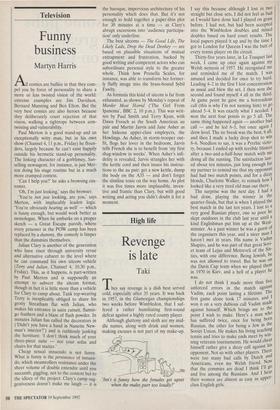Television
Funny business
Martyn Harris
I comics are bullies in that they com- pel you by force of personality to share a more or less twisted vision of the world: extreme examples are Jim Davidson, Bernard Manning and Ben Elton. But the very best comics are also heroes because they deliberately court rejection of that vision, walking a tightrope between arm- twisting and vulnerability.
Paul Merton is a good stand-up and an exceptionally witty man, but in his own show (Channel 4, 11 p.m., Friday) he floun- ders, largely because he can't exist happily outside his hermetic stand-up personality. The linking character of a gorblimey, Sun- selling newsagent, for instance, is just Mer- ton doing his stage routine but in a much more cramped context.
'Can I help you?' he asks a browsing cus- tomer.
'Oh, I'm just looking,' says the browser.
'You're not just looking, are you,' says Merton, with implacably leaden logic. 'You're obviously hearing as well' — which is funny enough, but would work better as monologue. When he embarks on a proper sketch — a Great Escape parody, where every prisoner in the POW camp has been replaced by a dummy, the comedy is limper than the dummies themselves.
Julian Clary is another of the generation who have risen through university revue and alternative cabaret to the level where he can command his own sitcom vehicle (Terry and Julian, Channel 4, 10.30 p.m., Friday). This, as it happens, is part-written by Paul Merton and is supposedly an attempt to subvert the sitcom format, though in fact it is little more than a vehicle for Clary to camp about. Tank top-wearing Terry is inexplicably obliged to share his grotty Streatham flat with Julian, who makes his entrance in satin catsuit, flamin- go feathers and a blaze of flash powder. In minutes Julian has called the decorators in ('Didn't you have a hand in Nanette New- man's interior?') and is ruthlessly junking the furniture: 'I don't think much of your three-piece suite — nor your sofas and chairs for that matter.'
Cheap sexual innuendo is not funny. What is funny is the persistence of innuen- do, which steamrollers resistance under the sheer volume of double entendre until you succumb, giggling, not to the content but to the idiocy of the project. Clary's camp sug- gestiveness doesn't make me laugh — it is
the baroque, impervious architecture of his personality which does that. But it's not enough to hold together a paper-thin plot for 30 minutes at a time — as Clary's abrupt excursions into 'audience participa- tion' only underline.
The best sitcoms — The Good Life, The Likely Lads, Drop the Dead Donkey — are based on plausible situations of mutual entrapment and frustration, backed by good writing and competent actors who can subordinate personal style to the greater whole. Think how Prunella Scales, for instance, was able to transform her former- ly fluffy image into the brass-bound Sybil Fawlty.
As formula this kind of sitcom is far from exhausted, as shown by Monday's repeat of Murder Most Horrid ('The Girl From Ipanema', BBC 2, 10 p.m.). This was writ- ten by Paul Smith and Terry Kyan, with Dawn French as the South American au pair and Martin Jarvis and Jane Asher as her hideous upper-class employers, the Howlings. As Asher, in storm-trooper out- fit, flogs her lover in the bedroom, Jarvis tells French she is to benefit from 'my first shag-window in weeks'. When Asher's infi- delity is revealed, Jarvis strangles her with the kettle cord and then issues his instruc- tions to the au pair: get a new kettle, dump the body on the A35 — and don't forget the slimline tonic on the way home. As plot it was five times more implausible, inven- tive and frantic than Clary, but with good writing and acting you didn't doubt it for a moment.


























































 Previous page
Previous page